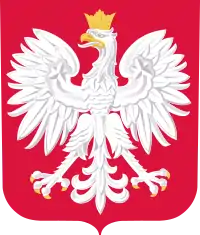Bulgaria–Poland relations
Bulgarian-Polish relations are foreign relations between Bulgaria and Poland. The countries established diplomatic relations in 1918 soon after Poland regained independence. Both countries are full members of the European Union and NATO.
 | |
Bulgaria |
Poland |
|---|---|
History

Relations between Bulgaria and Poland date back to the Middle Ages. In 1444, a coalition of Central and Eastern European countries led by Poland and King Władysław III of Poland fought in the Battle of Varna against the Ottoman Empire, in an attempt to repel the Ottoman invasion of Europe and liberate the already conquered nations of Southeast Europe, including Bulgaria. Bulgarian insurgents of Fruzhin fought alongside Poles in hope of restoring independence, however, the battle ended in the defeat of the coalition army and the death of the Polish king.
In the 19th century both nations shared a similar fate, as both were under the rule of foreign powers. Bulgaria was ruled by the Ottoman Empire, and Poland was partitioned between Austria, Prussia (afterwards Germany) and Russia. Bulgaria eventually regained independence in 1878, and Poland in 1918, and then both countries established diplomatic relations. In independent Bulgaria, a memorial complex dedicated to King Władysław III of Poland was erected in Varna, with a symbolic mausoleum of the fallen king.[1]
Recent political relations
For the first time in 13 years, on 18 April 2016, the Polish president, Andrzej Duda, was on a state visit to Sofia to meet his counterpart Rossen Plevneliev and Bulgaria's prime minister Boyko Borisov.[2] The heads of states discussed the options to expand business relations and deepen bilateral cooperation in the security sphere. In a joint press conference Presidents Plevneliev and Duda called for Russia to give up its "aggressive actions" and "come back" to international order and stood by the sovereignty and territorial integrity of Ukraine.[3]
Prime minister Borisov noted that Poland is a "very important country" for Bulgaria and Sofia values the development of bilateral relations in the context of the EU and NATO. Other topics of discussion were cooperation in defense and security, trade and economic relations and opportunities to realize their full potential. Mr. Borisov added that Bulgaria "relies" on Poland to support "common interests" in the field of energy security and in establishing the EU's Energy Union.[4]

President Duda said that his visit in Sofia is a "realization of the ABC format" – Adriatic, Baltic, Black Sea (in Polish – Adriatyk, Bałtyk, Czarne [Morze]) – a project to expand the transport and energy infrastructure in this large region. Mr. Duda also said "there is no doubt" that NATO must strengthen its eastern flank from the Baltic to the Black Sea.[5] In a joint statement, Mr. Duda and Mr. Plevneliev said that the forthcoming NATO summit in Warsaw in July is "crucial for the security of the countries of Eastern Europe". Mr. Plevneliev stressed the need for increased NATO presence in Central and Eastern Europe, as well as conducting more joint exercises and drills.[6]
Economic relations
Trade exchanges between the two countries have doubled over the past five years, from EUR 670 million in 2010 to EUR 1.3 billion in 2015.[7] Bulgaria is also traditional destination for Polish tourists as last year 260,000 Polish tourists visited Bulgarian resorts, the statement said. Statistical data from Bulgaria's National Statistics Institute confirms the figures and also shows that the trade exchange is more or less balanced, with imports from Poland slightly exceeding exports for the same period. For example, the trade data for 2015 shows that imports and exports from and to Poland are at about the same level as those with the Netherlands, a traditional investor and trade partner for Bulgaria.[8] Tourist visits from Poland have increased with 7% in 2014[9] and 3.2% in 2015. In 2015, Poland occupied the 8th spot in the top 10 ranking for most important tourist markets for Bulgaria. In January 2016, the Bulgarian Ministry of Tourism said it expects a 40% increase in the number of Poles visiting Bulgaria in 2016.[10] Major Bulgarian cities like the capital Sofia and Varna on the Black Sea coast have purchased Polish-made trams and buses for their public transport systems. According to media reports, the total figure of the purchase is valued at about EUR 90 million. Finally, for those observers careful enough to notice, apart from the gross figures, a couple of visits at Bulgarian supermarkets will show the large number of Polish-made goods available for sale.
Military cooperation
In October 2015, Bulgaria signed a contract with two Polish companies to carry out repair works on six engines for the country's Mig-29 fighter jets.[11] Maintenance and supply for the Soviet-made military hardware was usually done by Russia's RSK MiG, but in September 2015 the contract ran its course. The price of the Polish contracts was EUR 6.1 million and reports said it was lower than what the Russian company had offered, although a figure was never made public. Bulgaria's defense minister Nikolay Nenchev said the new contract would be about EUR 12 million cheaper. In December 2015, Poland delivered two spare Mig-29 engines to Bulgaria to be used while repairs on the other six engines will be ongoing.[12] At the end of March, the Bulgarian government approved a EUR 1.2 billion program aiming to modernize its ageing armed forces.[13] During Mr Nenchev's working visit to Warsaw in February 2015, the then-minister of defense of Poland, Tomasz Siemoniak, said Bulgaria was interested in Poland's experience with military reforms, drill programs, and equipment and military hardware.[14]
Upcoming projects
In March 2016, at an international conference in Warsaw government representatives from Lithuania, Poland, Romania, Slovakia, Turkey, Hungary and Ukraine signed a declaration on promoting the construction of the new transport route named Via Carpatia. Bulgaria was not a signatory to the document, but a Polish government spokesman was reported by Polish media as saying that Bulgaria supported the project and would "join it in the future". The statements by Presidents Duda and Plevneliev made in Sofia touch upon the development of trans-border links and infrastructure.[15]
Resident diplomatic missions
 Embassy of Bulgaria in Warsaw
Embassy of Bulgaria in Warsaw Embassy of Poland in Sofia
Embassy of Poland in Sofia
References
- "About us". Park-museum of military friendship 1444 „Vladislav Varnenchik”. Retrieved 7 February 2021.
- "Bulgaria and Poland – Warsaw's push toward the Black Sea". Archived from the original on 21 July 2016. Retrieved 25 May 2016.
- Плевнелиев: Русия е непредсказуема, трябва да се откаже от агресията
- Премиерът Борисов се срещна с полския президент Анджей Дуда
- Prezydent Duda w Bułgarii o NATO i formacie ABC (http://www.tvn24.pl)
- Президентите на България и Полша определиха като приоритет развитието на транспортната и енергийна инфраструктура в Източна Европа
- Президентите на България и Полша определиха като приоритет развитието на транспортната и енергийна инфраструктура в Източна Европа
- ТЪРГОВИЯ НА БЪЛГАРИЯ С ЕС ПРЕЗ 2015 ГОДИНА (ПРЕДВАРИТЕЛНИ ДАННИ)
- BULGARIAN TOURISM IN FACTS AND FIGURES (JANUARY – DECEMBER 2014)
- Ангелкова очаква ръст на френските, германските и полските туристи
- Bulgaria, Poland Sign Agreement on Repair of MiG-29 Fighter Jets
- Poland Delivers First Two Engines for Repair of Bulgaria’s MiG-29 Jets
- Bulgaria Approves Major Military Overhaul
- Siemoniak: Bułgaria zainteresowana współpracą polityczną i techniczną
- "Bulgaria and Poland – Warsaw's push toward the Black Sea". Archived from the original on 21 July 2016. Retrieved 25 May 2016.

